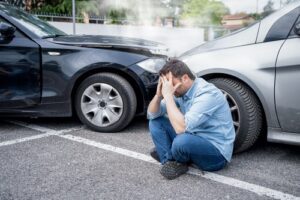Determining fault in a Georgia car accident is a critical step in navigating the aftermath of a collision. Georgia operates under a fault-based system, meaning the at-fault driver and their insurance company are responsible for covering the losses incurred by accident victims. However, proving fault can be complex, requiring a thorough investigation that considers police reports, witness statements, traffic laws, and evidence from the scene.
In this blog, we’ll delve into Georgia’s fault-based system for car accidents, the role of negligence, and the importance of working with an experienced car accident attorney to secure fair compensation.
Georgia’s At-Fault System
Georgia follows a fault-based approach when it comes to car accidents. This means that the driver who is found liable for the accident is responsible for covering the damages incurred. Understanding this system is crucial for anyone involved in a car crash, as it directly impacts how compensation is determined.
Overview of Georgia’s Fault-Based Approach to Car Accidents
In Georgia, the law operates on the principle that the driver responsible for the accident must pay for the resulting damages. This can include medical expenses, property damage, and lost wages. When an accident occurs, determining who is liable is essential. Factors such as traffic laws, witness statements, and police reports play a significant role in this assessment.
Responsibilities of the At-Fault Driver
The at-fault driver in a Georgia car accident has several responsibilities. First, they must provide compensation to the injured parties. This may involve paying for medical bills, vehicle repairs, and any other related costs. Additionally, the at-fault driver may face legal consequences, including increased insurance premiums or even civil lawsuits.
It’s important to note that Georgia operates under a modified comparative fault rule. This means that if the injured party is found to be partially at fault, their compensation may be reduced by their percentage of liability. For instance, if a driver is deemed 30% at fault for the accident, their compensation will be reduced accordingly.
Elements of Negligence
Understanding the elements of negligence is crucial for determining fault in a Georgia car accident. These elements help establish whether a driver acted irresponsibly, leading to an accident and subsequent damages. Below are the key components that must be proven in a negligence claim.
Duty of Care
Every driver in Georgia has a legal obligation to operate their vehicle safely. This duty of care requires maintaining a safe distance, adhering to traffic signals, and being attentive to other road users. When a driver fails to uphold this duty, they may be held liable for any resulting accidents.
Breach of Duty
A breach of duty occurs when a driver fails to meet the standard of care expected on the road. Common examples include distracted driving—such as texting while driving—speeding, or driving under the influence. Any of these actions can demonstrate that a driver did not act responsibly, contributing to an accident.
Causation
Causation links the breach of duty to the accident and the resulting damages. It must be shown that the driver’s negligent actions directly caused the accident. For instance, if a driver ran a red light and collided with another vehicle, the breach of duty (running the red light) would be the direct cause of the accident.
Damages
Finally, damages refer to the losses suffered by the injured party due to the accident. These can include physical injuries, medical expenses, lost wages, and emotional distress. In Georgia, successfully proving negligence requires demonstrating that these damages resulted from the at-fault driver’s actions.
Investigation and Evidence
In the aftermath of a car accident in Georgia, a thorough investigation is crucial in determining liability. The collection of evidence can significantly influence the outcome of any claims made.
Role of Police Reports and Official Documentation
Police reports play a vital role in the investigation process. When officers arrive at the scene, they document essential details, including the time of the accident, weather conditions, and witness statements. This official documentation serves as a primary source of information for insurance companies and legal representatives. A well-prepared police report can clarify who was liable, making it easier to assign liability.
Importance of Gathering Evidence at the Accident Scene
Gathering evidence at the accident scene is equally important. If you are involved in an accident, collect as much information as possible. This includes:
- Photographs: Take pictures of vehicle damage, skid marks, and the surrounding area. Visual evidence can provide context and support your version of events.
- Witness Statements: If there are bystanders, ask for their accounts of what happened. Their perspectives can corroborate your claims.
- Vehicle Information: Record the make, model, and license plate numbers of all vehicles involved. This information is necessary for insurance claims.
Comparative Fault in Georgia
In Georgia, the law follows a modified comparative fault rule. This means that when determining fault in a car accident, the blame can be shared among multiple parties involved. The key aspect of this rule is that a driver’s ability to recover damages is directly impacted by their level of fault in the accident.
Explanation of Georgia’s Modified Comparative Fault Rule
Under this rule, if you are found to be less than 50% at fault for the accident, you can still recover compensation for your damages. However, your recovery will be reduced by your percentage of fault. For instance, if you were determined to be 30% at fault and your total damages amount to $100,000, you would be eligible to receive $70,000. This reduction reflects the shared responsibility for the accident.
Impact on Compensation When Multiple Parties Share Fault
When multiple parties are involved, the situation can become more complicated. Each party’s level of fault will be assessed, and compensation will be adjusted accordingly. If you are found to be 50% or more at fault, you will not be able to recover any damages. This system encourages all drivers to practice safe driving habits, as any negligence can significantly impact their financial recovery after an accident.
Parties Involved in Liability
In a Georgia car accident, multiple parties can be involved in determining liability. The at-fault driver is often the primary focus, but others may share responsibility. Understanding how these parties interact is crucial for recovering compensation.
At-Fault Driver
The driver deemed responsible for the accident is the primary party liable for damages. This determination is based on their actions leading up to the incident. Factors such as distracted driving, speeding, or driving under the influence can all contribute to establishing fault.
Other Drivers
Sometimes, other drivers may also share in the blame. If a second driver contributed to the accident—perhaps by changing lanes unsafely or running a red light—this can complicate liability. Georgia’s comparative fault rule allows for damages to be divided based on each party’s level of negligence.
Passengers
Passengers can play a role in liability as well. If a passenger was aware of unsafe driving behavior and did not speak up, their actions may be scrutinized. While they typically cannot be held liable for the driver’s actions, their testimony can impact the overall case.
Pedestrians and Bicyclists
In accidents involving pedestrians or bicyclists, their actions can also affect liability. If a pedestrian crossed the street unlawfully or a cyclist failed to follow traffic signals, these factors may shift some responsibility away from the driver.
Vehicle Owners
In some cases, vehicle owners can be held liable even if they were not driving at the time of the accident. For instance, if a vehicle owner allows an unfit driver to operate their vehicle, they may share liability. This is especially relevant in cases involving commercial vehicles.
Insurance Companies
Insurance companies play a significant role in determining liability. They conduct their investigations and may assign fault based on their findings. However, their assessments may not always align with the legal definitions of fault. It is essential to have a skilled lawyer to navigate these discussions and advocate for fair compensation.
Consult With an Experienced Car Accident Lawyer ASAP!
If you’ve been injured in a car accident, determining fault and securing the compensation you deserve can be overwhelming. Let our dedicated team at Ross Moore Law guide you through the process.
Contact us at 404-445-8122 for a free case consultation today!






